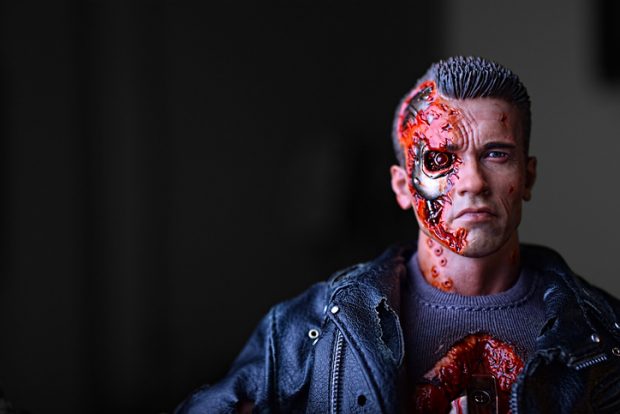Our Cyborg Future: Why the Merger of Man and Machine is Inevitable

From the launch of the first BlackBerry smartphone in 2003 until sometime around 2014, in the marketing and tech industries, every year was declared “the Year of Mobile.” As marketers, we didn’t really know if or when the Year of Mobile had ended until it was suddenly, really, clearly over. Without a doubt, the Year of Mobile is behind us, and the marketing buzzword of choice is now AI.
Last week we hosted an AIMA Innovation event at our office about Artificial Intelligence called “AI and the Transformation of Marketing.” We had compelling speakers from Google, UPS and KPMG who did an excellent job breaking down AI and what it means for business and marketers. The event and subsequent discussions made me want to weigh in on where I think this is all heading.
Major tech giants like Apple, Amazon, Google and Adobe are all waging a battle to own AI. They’re waging this battle on a variety of fronts, from personal devices like Google Home, to paid media platforms, to personalized website and mobile experiences and a variety of other digital experiences. Sundar Pichai, CEO of Google, says “We will move from mobile-first world to an AI-first world.” Nearly every platform claims some level of AI or machine learning.
And marketers are making sure they don’t miss out on the show either. Just last week, Publicis Groupe made a big splash with their decision to focus on an AI assistant they’d built instead of entering award shows.
All of this AI talk has really smart people like Stephen Hawking, Bill Gates and others pondering a bleak future where the machines take over Terminator-style, wiping us out or simply rendering us pets or food.
And while all of those people are way smarter than me, I think they’re wrong.
Being clear, it’s not because I don’t believe that machines will become self-aware. And it’s not because I doubt the unimaginable advantages machines will have over humanity. They clearly will.
It’s because it will never get to that point to begin with.
I believe our future isn’t one where we’ll be dominated by machines. Our future will be merged with machines.
I’m not the only one who thinks this. Renowned futurist, scientist and inventor Ray Kurzweil — for one — thinks this will happen within 10 to 15 years.
Most of us push back against this idea because we can’t imagine allowing machines or AI to become a part of us. We don’t want to be tracked. We don’t want to lose control. We don’t want to lose autonomy over our minds or our movements. We fear that merging with machines will allow the government or big corporations into our most private and sanctified place — our bodies.
The reality is that it won’t be an immediate change. It will be a slow drift, and it’ll start in two distinct areas first.
The beginning of the man-machine merger starts with health and productivity.
As technology improves, we’ll gleefully allow technology to be fused with our bodies to keep us (or our loved ones) from dying. Implanting chips to detect and prevent heart attacks, administer insulin drops, find and root out cancer and more will be a no-brainer for most of us.
Potential productivity enhancements will also drive the merger. Exoskeletons that enable us to move faster, lift heavier objects and become less tired will one day be the norm. Memory and/or processor technology embedded in our bodies that allows us to remember more, improve our IQ and allow us to know multiple languages will be far too tempting for humanity to resist.
It’ll be like performance-enhancing drugs on steroids (clever and cheesy pun intended).
Moreover, the combination of man and machine is more powerful than either could be alone. There are already examples of this. Centaur Chess provides a real-life example of how man and machine can crush AI alone.
In summary, we shouldn’t fear an AI-dominated world. We should fear the coming class warfare that separates those who can buy man/machine enhancements versus those who can’t. This will bring a new level of class warfare never before seen in human history. (Whether you liked the 2013 Matt Damon movie "Elysium" or not, they did a great job giving a glimpse into this future world.) It will also usher in even more dangers presented by the powerful — whether governments or corporations.
We can try to create laws and industry standards to prevent abuse. In the short term, this will likely be a losing battle.
But like nearly everything that happens in nature or business, the ecosystem will eventually settle, and there will be a semblance of balance.
So yes, AI is the buzzword du jour for now. But it’s not a fad. It’s slightly more complicated than we probably think, but as humans first and marketers second, our job is to prepare. We must not let the future simply happen to us. We must shape it. Bend it. Influence it. And hope that we get smart enough, quick enough, to retain some measure of humanity in our cyborg future.
Provided we don’t destroy ourselves along the way.

Comments
Add A CommentJessica - thank you for reading the post and the kind words! Those are all great questions. It will definitely be interesting to see how the future unfolds.
I thoroughly enjoyed reading this post. I have had similar discussions and arguments with colleagues and friends who hypothesize about this subject matter. My question is that if we can theoretically join forces with AI and live longer because of it, at what point could we transfer or download our sole or life essence into a surrogate body or replicant? Even with technological enhancements, our bodies can't defy gravity, aging, or death. We might be able to ward it off for a while but I doubt we can beat it entirely. Would the lucky few who can "transfer over" be the fate of civilization? Would we cease to procreate? Would we then be a world filled with Replicants who encompass a gallery of memories from their "human days"? I am eager, excited, nervous, scared, and optimistic all at the same time. The future sounds incredibly interesting if nothing else! Thank you for the good read.
-Jessica